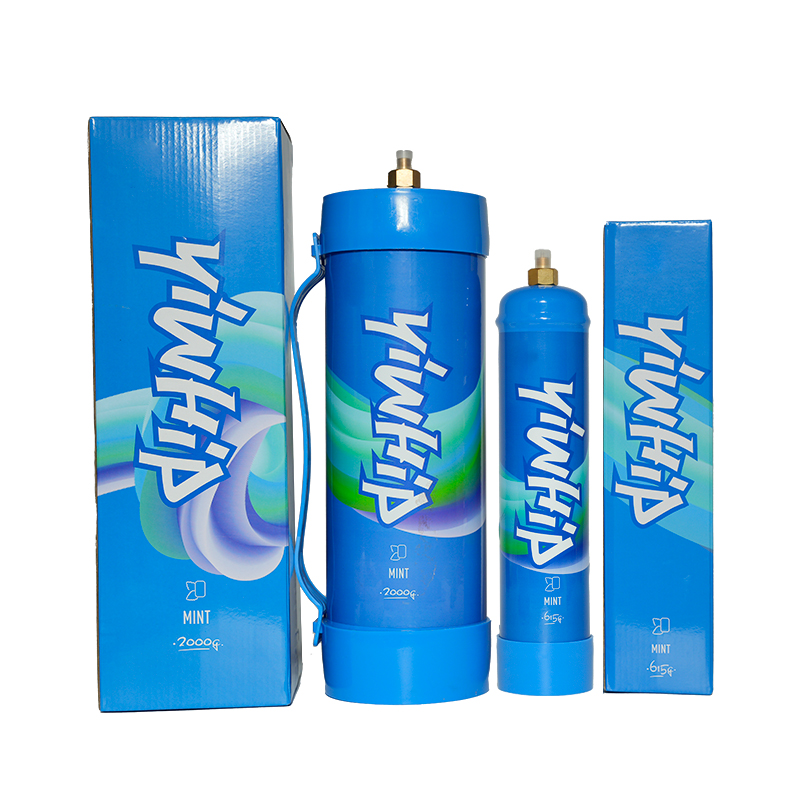When it comes to creating airy, luscious whipped cream, a high-quality **whipped cream canister** is a must-have tool in your kitchen arsenal. Whether you're running a bustling cafe, hosting an event, or simply upgrading your home bar setup, investing in the right nitrous oxide (N2O) cream dispenser can make a world of difference in consistency, efficiency, and taste.
Key Features to Consider Before Buying a Whipped Cream Canister
Purchasing a professional-grade whipping canister means more than just finding one with a stylish design — it’s about performance and durability that lasts for years to come. Here are the essential features you should evaluate before making your choice:
- Volumetric Capacity: Cream canisters typically come in sizes ranging from 0.5 liters up to 1 liter. If you’re preparing single servings frequently, a half-liter model may be adequate. However, chefs, bartenders, or anyone regularly dealing with larger batches will find value in 1-liter versions.
- Material Quality: Most commercial-level dispensers are built from durable, corrosion-resistant stainless steel, ensuring long-term usage while staying safe under internal pressure caused by N2O charging.
- Pressure Performance & Leak-Proof Design: Look for models engineered to safely release controlled air pressure while minimizing risk of bursting or unwanted leakage when handled properly. High-grade models feature reinforced seals to prevent seepage during vigorous shaking or extended storage time.
- Chicory Head Compatibility: An adjustable whip head makes life simpler when switching between different types of dispersions — be it foams, flavored mousses, sauces, or traditional sweetened cream textures.
- Nozzle Varieties: Some cream dispensers allow for changing nozzle tips — star patterns for elegant cake plating or straight openings for faster pouring applications — enhancing presentation options significantly.
- Ease of Use: A smooth threading mechanism ensures easy loading and discharging. It's also helpful to invest in models equipped with dripless lids so messy cleanups don't spoil your flow mid-service rush hour.
- Ease of Clean-Up & Care: Opting for models suitable for both manual cleaning or dishwasher compatibility speeds up turnaround time and promotes consistent hygiene maintenance, particularly in high-turnout settings like patisseries, dessert kiosks, or catering stations.
Differentiating Consumer Versus Commercial Models
If you plan on daily production, especially within the food services niche, opting for commercial-standard gear makes all the difference over consumer-friendly versions.
| Category | Consumer Version | Professional Models |
|---|---|---|
| Usage Suitability | Perfect for small households or weekend brunch gatherings | Ideal for coffee shops, gourmet bakeries, and restaurants handling large orders efficiently |
| Material Strength | Larger proportion made from aluminum or basic steel which degrade slightly faster under heavy pressure exposure | Built using medical/food-grade grade 304 stainless alloys designed to endure extensive repressurization sessions without compromising integrity overtime |
| Durability Expectations | Estimated lifespan averages 2 -3 years with irregular application schedules | Commercial ones usually withstand regular heavy duty use lasting well above five years even with intense daily workflows involved |
| Design Customization Potential | Limited accessory upgrades due mostly budget-friendly construction | Frequent availability for multiple size options alongside interchangeable tip heads tailored toward varying recipe viscosity needs such as espresso-infused foam toppings and savory sauce infusions too |
Professionals also often appreciate enhanced structural elements — including double-thread lid mechanisms preventing unexpected bursts — and better heat resistance capabilities when filling the machine directly from hot bases. These refinements reduce equipment fatigue dramatically during multi-shift operations and ensure consistently creamy outcomes no matter how demanding a service becomes.
Top Picks for the Professional Whipping Experience (2025 Reviews Included)
To narrow down our list into truly standout performers that stand out among professionals across various price brackets, we reviewed hundreds of products, filtered based on real customer data feedback loops plus verified third-party durability tests, resulting in top picks that serve as best value for restaurant owners, mixologists or passionate culinary creators seeking excellence in aerated cream delivery every day without fault lines surfacing.
#1 – MOSA Whip Master Series Pro 6 oz / 500 mL Stainless Steel Cream Dispenser (Packaged Set)
The Mosher Premium line brings together exceptional versatility combined with rock-solid industrial design that delivers consistently rich results each session after session effortlessly.

- Built-in dual locking systems that guarantee spill-safe operation regardless if tilted horizontally for artistic topping designs onto pastries/crusts/desserts etc., even during active transportation scenarios.
- Certified food processing grade stainless steel body compliant with FDA/EU standards.
- Meticulous internal polish minimizes dairy sediment accumulation over cycles — aiding sanitization speed dramatically between rounds.
- Includes 18 standard-size N2O chargers — giving newcomers immediate start-up ease.
#2 — JupiterWhip TitanPro 8 oz / 750 mL Creamer Machine – Dual Gas Charge Option System
If scalability and flavor infusion diversity excite your chef's mindset — look no further than the TitanPro unit capable of producing either nitrogen-aerated texture via N2 gas injection — or carbonized fizziness ideal for soda-like foam recipes through CO2-enabled cartridge conversion adaptors available separately or included within select combo bundles.
Bold Technical Specs Breakdown:- Bore size widened by precision machining techniques improving discharge rates per second compared traditional units operating at same PSI values—making prep swifter in fast-food cafes where timing determines profit margins sharply.
- All exterior edges fully polished reducing potential cuts risks when rushed handling in cramped spaces.
- Aesthetic chrome-plated shell resists minor knocks — maintaining shopfront-worthy shine longer than raw SS alternatives do naturally over prolonged abrasive contact.
- BTW Independent Bar Equipment Insights, Q4 '23 Survey Summary
Expert Recommendations for Long-Term Ownership Satisfaction
Pro Tip #1 – Stick To Reputable Charger Manufacturers
Nitrous canisters come in various shapes and sizes across competing brands — though many cheaper ones might offer apparent upfront cost reduction, these can lead to issues like seal failures or uneven distribution affecting foam density unpredictably causing customer dissatisfaction over inconsistencies between portions served minutes apart. Sticking primarily to recognized providers like iSi Gasline or Whip-it! ensures steady energy output with every burst.
Pro Tip #2 – Deep-Clean Your Unit Weekly
Relying solely on rinsing doesn't suffice over months. Milk proteins left embedded within crevices cause stubborn residues hard to extract later down timeline, risking mold growth potentially spoiling fresh future concoctions. So, schedule bi-weekly soak periods (if not daily) in enzyme-infused degreaser baths followed by sterilizing steaming helps prolong optimal function significantly.
- Create fixed reminder schedule using digital kitchen logbooks app integration platforms
- Treat dispenser units similarly as sous vide bags – sanitize after each major shift rotation involving back-to-back batch preparations exceeding 100 serving outputs within same timeframe
Extra Storage Hacks Worth Mentioning
Consider adding a simple protective sleeve over valve area before storing in metal cabinets — reduces dust intake which affects sensitive mechanisms inside leading to inconsistent charge release. Another good idea? Keeping your spare cartridges stored nearby dispenser units rather than in fridge areas (unless manufacturer explicitly recommends otherwise) since temperature fluctuations tend to corrode canister shells earlier than average rated lifetimes would indicate ideally.

